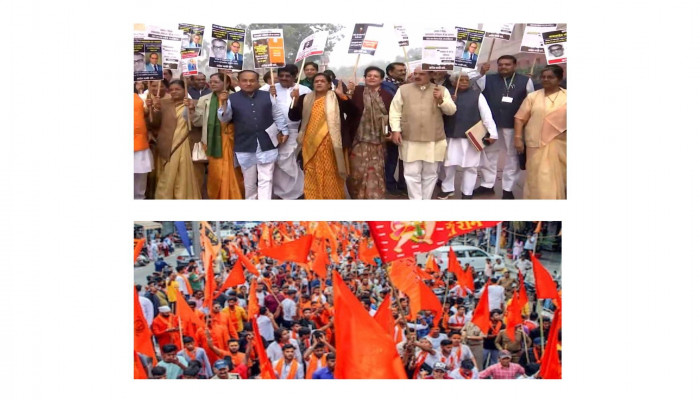VHP reaches to 350 MPs seeking support for three key issues concerning Hindus
- In Reports
- 09:57 PM, Dec 20, 2024
- Myind Staff
During the chaotic winter session of Parliament, overshadowed by loud arguments on the Constitution and Ambedkar and even allegations of physical altercations, the Vishwa Hindu Parishad (VHP), a subsidiary of the RSS, quietly pursued its agenda of promoting saffron unity in tune with the BJP's "Ek hai to Safe hai" slogan.
The VHP reached out to over 350 MPs, engaging them on three key issues concerning Hindu society: the liberation of temples from government control, the Waqf Amendment Bill and the extension of privileges granted to minorities under Articles 29 and 30 of the Constitution to Hindus as well. According to VHP Secretary General Bajrang Lal Bagra, the campaign ran from December 2 to December 20, involving cadres from various states who communicated in multiple languages and represented diverse sects.
In the first phase of this outreach, from December 2 to 6, VHP representatives from Kerala, Tamil Nadu, Karnataka, Andhra Pradesh, Telangana, Odisha, West Bengal, and Maharashtra contacted 114 MPs from both the Lok Sabha and Rajya Sabha, marking the beginning of a phased engagement effort.
In the second phase of its campaign, conducted from December 9 to 13, VHP cadres from Chhattisgarh, Madhya Pradesh, Gujarat, Rajasthan, Delhi, Haryana, Himachal Pradesh, Punjab and Jammu & Kashmir reached out to a total of 139 MPs from these regions. The third and final phase commenced on December 16, with cadres from Uttar Pradesh, Uttarakhand, Bihar, Jharkhand, Assam, Meghalaya, Arunachal Pradesh, Tripura, Manipur and Nagaland engaging with their respective MPs in the national capital.
This meticulous three-phased campaign, set to conclude on December 20, focused on three key issues aimed at advancing the "Hindu cause." These included the demand to liberate Hindu temples from government control, urging MPs to amend and rationalise Waqf laws and advocate for extending the constitutional privileges under Articles 29 and 30—currently reserved for minorities—to include the Hindu society, which, as per the VHP, remains the only group deprived of this right.
Several Indian states currently have laws that grant them significant control over the management, expenses and income of Hindu temples. Earlier this year, BJP vice-president Subhash Sharma wrote to Punjab Chief Minister Bhagwant Mann, urging that Hindu religious places be freed from government control and handed back to Hindu society. This demand gained further momentum with the controversy surrounding the Tirupati laddu, a sacred offering at the Tirumala Venkateswara Temple, which underscored the broader concerns over state interference in temple affairs. The VHP has now formally taken up this cause, seeking to end government control over Hindu temples.
On another front, the Modi government has proposed an amendment to the Waqf law, a move that has sparked significant controversy and led to the matter being referred to the Joint Parliamentary Committee. The VHP has actively backed these efforts, aligning with the government's agenda.
Furthermore, by advocating for facilities to establish Hindu religious educational institutions—similar to those enjoyed by minority communities under Articles 29 and 30—the VHP echoes its foundational 1964 slogan, Dharmo Rakshati Rakshitah (Dharma protects those who protect it). This rhetoric reinforces a sense of unity and subtle urgency, encapsulated in the sentiment that "we must remain one." Throughout these efforts, RSS affiliates, including the VHP, have operated with deliberate silence, diligently advancing their objectives.







Comments